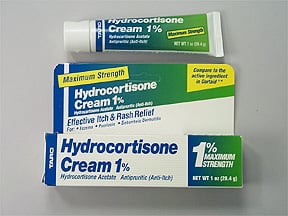
Hydrocortisone Plus Coupons & Savings Card – Discount Prices from $3.61
Brand for: Hydrocortisone
This medication is used to treat a variety of skin conditions (such as insect bites, poison oak/ivy, eczema, dermatitis, allergies, rash, itching of the outer female genitals, anal itching). Hydrocortisone reduces the swelling, itching, and redness that can occur in these types of conditions. This medication is a mild corticosteroid.
Our Hydrocortisone Plus coupons are free to use. You can print the coupon, email it to yourself, or receive the Hydrocortisone Plus coupon via text message. To get your free discount, show the pharmacist your Hydrocortisone Plus savings card which has the discounted coupon price. Use our filters below to edit the prescription box to match your needs. The Hydrocortisone Plus prices will update based on your prescription needs. Above our Hydrocortisone Plus coupons, you can change the location to see pharmacy prices in other areas. Our prescription discount card will update online with the specific pharmacy costs associated with your edits. Be sure to text, email, or print the Hydrocortisone Plus savings card code that you need after editing the prescription box and location field. Show the discount card to your pharmacist before paying.
My prescription
Edit
1%, Hydrocortisone (1 Cream)
Select pharmacy

Walgreens
$3.61
COUPON PRICE
Albertsons
$3.61
COUPON PRICEHydrocortisone Plus savings card
Show this card to your pharmacist
Walgreens
$3.61
BIN
ID
PCN
GRP
011867
LH2153A8CF
HT
LABH001
Powered by
This medication is used to treat a variety of skin conditions (such as insect bites, poison oak/ivy, eczema, dermatitis, allergies, rash, itching of the outer female genitals, anal itching). Hydrocortisone reduces the swelling, itching, and redness that can occur in these types of conditions. This medication is a mild corticosteroid.
Our Hydrocortisone Plus coupons are free to use. You can print the coupon, email it to yourself, or receive the Hydrocortisone Plus coupon via text message. To get your free discount, show the pharmacist your Hydrocortisone Plus savings card which has the discounted coupon price. Use our filters below to edit the prescription box to match your needs. The Hydrocortisone Plus prices will update based on your prescription needs. Above our Hydrocortisone Plus coupons, you can change the location to see pharmacy prices in other areas. Our prescription discount card will update online with the specific pharmacy costs associated with your edits. Be sure to text, email, or print the Hydrocortisone Plus savings card code that you need after editing the prescription box and location field. Show the discount card to your pharmacist before paying.
Hydrocortisone Plus FAQs
Using the SaveHealth discount card, what is the price of Hydrocortisone Plus without insurance?
Using the SaveHealth discount card, the price of Hydrocortisone Plus without insurance is $3.61.
What is the price of Hydrocortisone Plus at Walgreens?
The price of Hydrocortisone Plus at Walgreens is $3.61.
